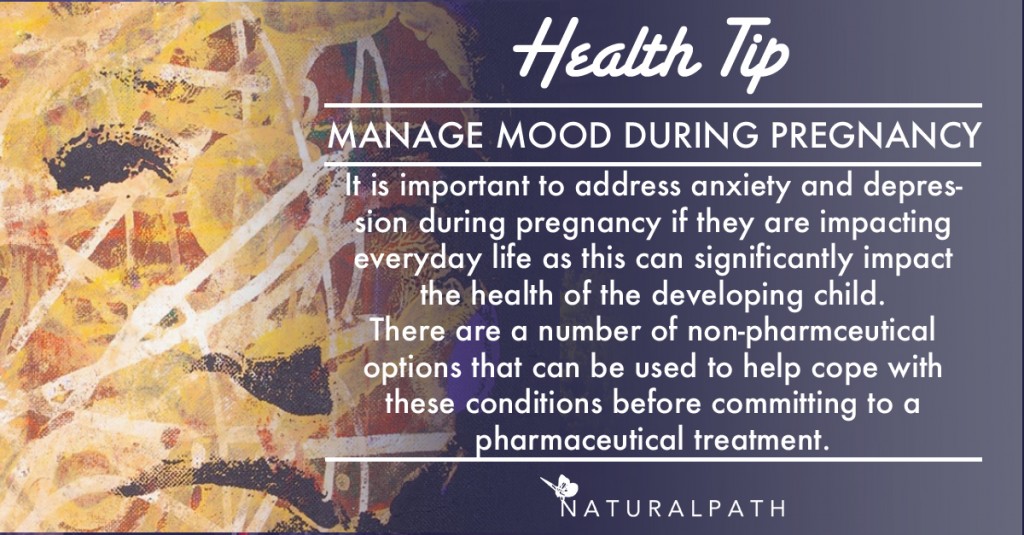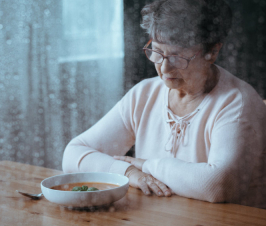Pregnancy is an exciting, hopeful and important time for expecting parents, but can also bring on a state of fear, and uncertainty. With the rapid change in hormones, the potential for unexpected events, anticipating labour, and becoming a parent, can evoke a level of anxiety and fluctuating moods in anyone. It has been found that symptoms of anxiety, depression and fatigue are more experienced during pregnancy than after, and at least half of post-partum depression cases start during pregnancy.1,2 In fact, non-psychiatric mental disorders, such as depression and anxiety, are the most common conditions women experience during their pregnancy.3 Identifying and treating anxiety and depression during pregnancy is very important as the prenatal and perinatal environment can greatly impact the development of the baby. Anxiety and depression are both related to stress; stress activates our adrenal glands to produce stress hormones such as cortisol, which at high levels has been shown to impact the development of the systems related to stress management in a growing fetus.4 Children who are born to mothers who are depressed or anxious during pregnancy have higher risk of mental health disorders, impaired cognitive skills, and tend to have higher stress hormones during infancy and adolescence.2 A recent study found that prenatal and postnatal depression in women increased risk for depression of the child at 18 years.5Depression and anxiety during has been linked to insufficient weight gain, lower birth weight and apgar scores.2 Also, increased levels of stress hormones suppress the immune system, and as pregnancy already increases susceptibility to infection, this is another important reason why addressing conditions related to stress during the pregnancy is important.
Natural Treatments for Anxiety
Women who have anxiety and depression before they are pregnancy are more likely to experience this during a pregnancy. Strategies that are geared towards preventative approaches, include interpersonal psychotherapy, has been found to reduce the risk of postpartum depression in women with high risk.3 Prevention of anxiety during pregnancy can be mitigated with interventions such as cognitive behaviour therapy, hypnotherapy, guided imagery and yoga, and can also be applied during active treatment.3
Though preventative methods can help reduce the level of anxiety and depression, there are a number of women who may need active treatment to help cope with these emotions. Though antidepressant use during pregnancy is typically not recommended, it is commonly used to help manage symptoms if the prescribing physician feels the impact of the mood has a greater negative effect on the pregnancy compared to the pharmaceutical drug. Though this is routine in the conventional medical community, many women would prefer a safer alternative have turned to non-pharmaceutical treatments in order to manage these concerns.
Magnesium
Magnesium is a common nutrient used to help alleviate stress and anxiety. It is a mineral that provides a calming effect and its deficiency has been linked to anxiety and plays a positive role in how the body copes with stress.6 In pregnancy, magnesium can be used for anxiety, depression, and insomnia, with its use being monitored by a qualified health professional. Magnesium supplementation has been found to be effective and safe to higher doses in pregnancy,7 especially in cases of high blood pressure.
Exercise
Exercise has been known to help improve symptoms of anxiety and depression in the general public and pregnancy is no different. Research has found women who exercise 30 minutes daily, 4 times per week, are more likely to report fewer cases of anxiety, depression and fatigue, compared to pregnant women who do not exercise.2 Though the exact mechanisms are not yet clear as to why exercise can help mood, it has been repeatedly demonstrated through clinical studies that exercise during pregnancy can drastically improve mood. Exercise should be monitored by a professional who has experience with training pregnant women, especially for those who are new to exercise. Please avoid any sport that involves significant jumping activity, and physical contact. Women who are experienced can perform 85% of their normal exercise routine during pregnancy, pending that it does not involve the limitations previously mentioned.
Herbal Remedies
There are a number of herbal remedies used to treat anxiety and depression though these are not typically recommended to be self-prescribed during pregnancy. In my clinical experience, the low doses of herbal medicines provided though teas/water infusions can be safe, but can still have a profound effect on mood. Herbal remedies such as chamomile, oat straw and lemon balm, are excellent herbs for this use as they are generally considered safe and work primarily on mood by balancing factors in the brain rather than manipulating hormones. I often prescribe teas towards the end of the night to help calm the mind from a busy day, and along with basic relaxation techniques (no screen time, deep breathing, meditation), this can calm the mind, reduce stress hormones, and help with transition in to sleep. Lavender essential oils also provide calming affect on the body through passive inhalation; lavender essential oils can be added to humidifers, or to the pillow for inhalation while sleeping. Though these methods are relatively safe, it is always my recommendation to consult with a qualified, licensed physician before trying any herbal remedy during pregnancy.
Mood changes during pregnancy are commonly experienced by women and can be addressed using lifestyle and natural therapies. It is important to address anxiety and depression if they are significantly impacting everyday life as this can significantly impact the health of the developing child, before and after birth. Many women prefer to try non-pharmceutical treatments before committing to the pharmaceutical route. Including the suggestions in this article, there are a number of additional natural treatments that can be prescribed under the supervision by a qualified health professional, such as a naturopathic doctor, to help with anxiety and depression during pregnancy.
 Dr. Tanya Lee, N.D. received her Honours Bachelor of Science degree in Biochemistry and Biomedical Sciences from McMaster University, and was trained as a Naturopathic Doctor at the Canadian College of Naturopathic Medicine. Dr Lee practices full-time between two clinics located in Toronto and Milton Ontario and has been voted Milton’s favourite Naturopath in 2013 and 2014. Her primary care practice focuses on family medicine, treating a wide variety of conditions such as hormonal (endocrine) disorders, fertility, digestive problems, cardiovascular disease, diabetes, insomnia and fatigue. She has a special interest in the treatment of autoimmune diseases, paediatric and perinatal health. Tanya offers her clinical knowledge to a number of publications, including the Natural Path.
Dr. Tanya Lee, N.D. received her Honours Bachelor of Science degree in Biochemistry and Biomedical Sciences from McMaster University, and was trained as a Naturopathic Doctor at the Canadian College of Naturopathic Medicine. Dr Lee practices full-time between two clinics located in Toronto and Milton Ontario and has been voted Milton’s favourite Naturopath in 2013 and 2014. Her primary care practice focuses on family medicine, treating a wide variety of conditions such as hormonal (endocrine) disorders, fertility, digestive problems, cardiovascular disease, diabetes, insomnia and fatigue. She has a special interest in the treatment of autoimmune diseases, paediatric and perinatal health. Tanya offers her clinical knowledge to a number of publications, including the Natural Path.
References:
- Poudevigne, , O’Connor, PJ. A review of physical activity patterns in pregnant women and their relationship to psychological health. Sports Medicine 2006, 36, 19–38. doi:10.1249/01.mss.0000174907.27818.ff
- Gaston A, Prapavessis H. Tired, moody and pregnant? Exercise may be the answer. Psychol Health. 2013;28(12):1353-69. doi: 10.1080/08870446.2013.809084. Epub 2013 Jul 10.
- Howard LM et. al. Non-psychotic mental disorders in the perinatal period. 2014 Nov 15;384(9956):1775-88. doi: 10.1016/S0140-6736(14)61276-9. Epub 2014 Nov 14.
- Kapoor et al., Foetal programming of hypothalamo-pituitary-adrenal function: prenatal stress and glucocorticoids. J Physiol. 2006; Pt 1: 31–44 (Apr 1)572.
- Quarini C et. al., Are female children more vulnerable to the long-term effects of maternal depression during pregnancy? J Affect Disord. 2015 Sep 25;189:329-335. doi: 10.1016/j.jad.2015.09.039.
- Sartori SB Magnesium deficiency induces anxiety and HPA axis dysregulation: modulation by therapeutic drug treatment. Neuropharmacology. 2012 Jan;62(1):304-12. doi: 10.1016/j.neuropharm.2011.07.027. Epub 2011 Aug 4.
- Guerrera MP al Therapeutic uses of magnesium. Am Fam Physician. 2009 Jul 15;80(2):157-62.


















